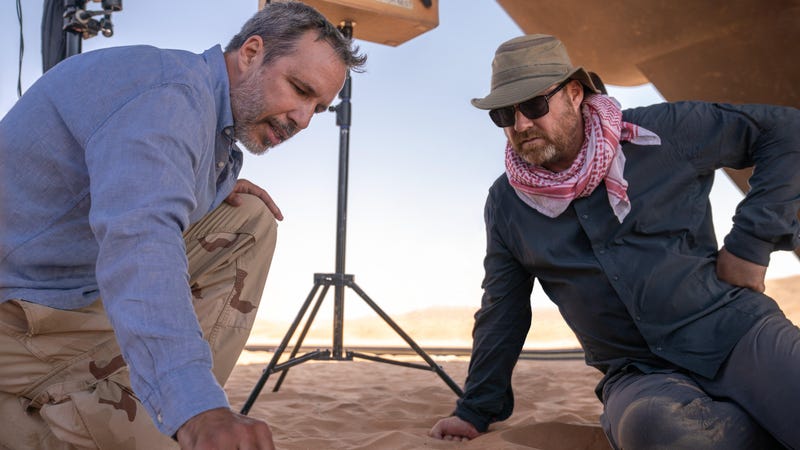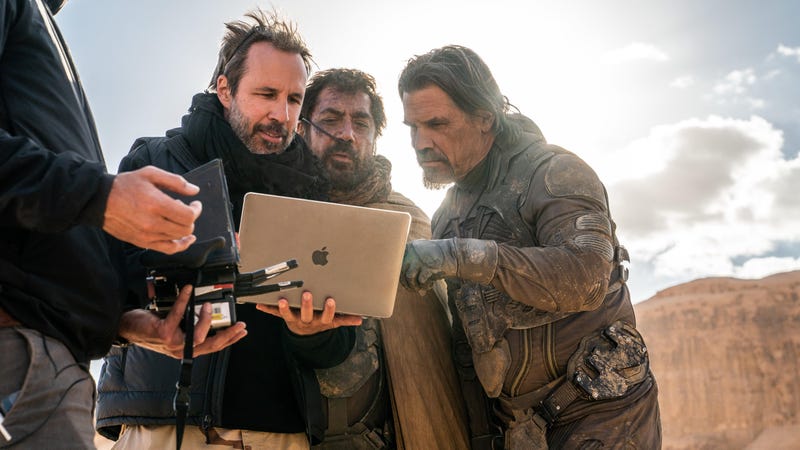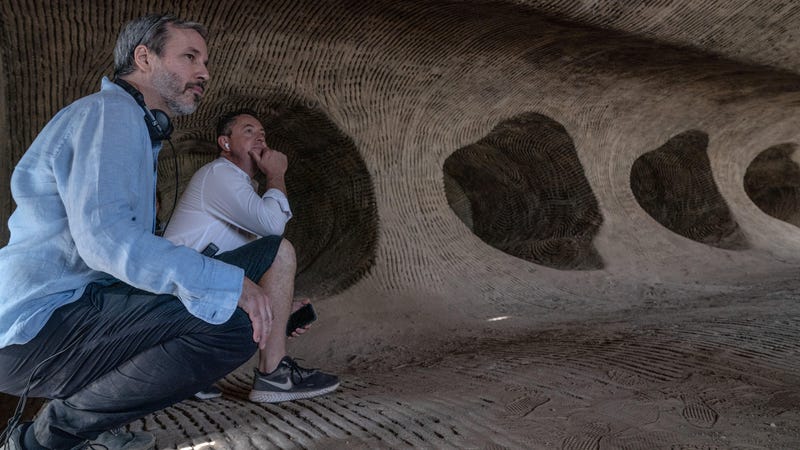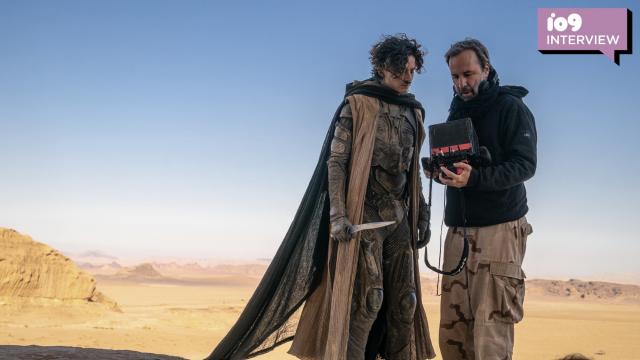If you hadn’t already done it after Arrival or Sicario or Blade Runner 2049, we think it’s time to officially declare that Denis Villeneuve is one of the best filmmakers working today. He cements that and more with Dune: Part Two, a thrilling, engaging conclusion to Villeneuve’s vision of adapting Frank Herbert’s Dune. One that has been on his mind for decades, and in the works for pretty long too.
Few filmmakers would’ve had the guts to say “This story is two movies” and then convinced a studio to agree to that. But Villeneuve did, resulting in a Part One that won six Oscars and now a Part Two that’s ready to bring the box office back.
io9 spoke to the filmmaker recently and we talked about all of that and more: whether he ever regretted splitting the story into two pieces, how he approached the filmmaking differently this time around, the responsibility of bringing the sandworms to the screen, crafting Timothée Chalamet’s performance as Paul Atreides, and of course, Lego. Plus, if you were curious about what the heck is up with those little sound blips before the studio logo, he explains.

This interview was edited for length and clarity.
Germain Lussier, io9: Congratulations. The movie is so good, and I expected nothing less having seen the first one and everything else you’ve done. But watching this, I wondered, what would have happened if the first one didn’t work? Would this have been made? Did you ever even contemplate that this wouldn’t get made?
Denis Villeneuve: The thought occurred to me as I was shooting Part One when I was in the desert. I remember saying to myself, “Enjoy the moment, because you might not come back here with those characters.” It could have happened. It was part of the gambling I was doing [with the adaptation]. But I knew once the movie was finished that Legendary was absolutely pleased and happy with the movie. And I got the assurance very quickly, in fact, that there would be a Part Two no matter what happened. But let’s say that as I was shooting, I was remembering that I had to be at peace that [this] could be it.
io9: Okay. Well, I’m glad that we didn’t have to deal with that. Let’s talk about the movie structure which I found very interesting. Obviously, the movie is very much about Paul’s journey, and we see an incredible arc there. But after the quick little thing at the beginning, we spend probably about an hour with Paul in the desert without cutting away. How did you decide on that and settle on the balance of when to cut over to the Harkonnen story, as opposed to a more traditional cross-cutting?
Villeneuve: Yeah. The idea was really to make the movie as immersive as possible and at the beginning, you have to really believe that Paul is taking roots into the Fremen culture and that he gained their trust. And I thought it was a much more of a cinematic way to approach it, to make it big blocks like that, instead of doing more like exotic moments spread around in the screenplay. I wanted to [make sure] the audience is being immersed, like Paul in the film, in the Fremen culture and to feel the first part of his arc. It felt stronger this way.
io9: And when did you make that decision? Was it during the writing or during the editing?
Villeneuve: Both writing and editing.

io9: Got it. I love that both movies have this weird little moment before the studio logo of some kind of Dune language statement. Is that something you have to okay with the studio? Because ultimately it’s their movie and you’re putting your mark before their logo. Was there any pushback and what was your thinking in doing that?
Villeneuve: The first time in Part One, the truth is that as we were doing sound design and developing ideas for sound, we came up with this language that was developed by Hans Zimmer that I absolutely adored. And there was this idea of putting a statement right before the logo to own the space. And maybe it was a reaction at that time, an arrogant reaction by me, but I didn’t get any pushback. Everybody loved the idea. And I love it when you watch a movie and it’s not a slow-down descent, it’s an abrupt start. You put away the parking lot and your concern about dinner. [Slap noise] Right away, it’s like, “Okay, guys, listen.” A bit like in theater when you have the boom at the beginning to say to the audience, “Okay, quiet down, we start right now.” I love that.
io9: Yeah. it’s wonderful. Now, I haven’t read the books in a few years but watching the film, it seemed as if you significantly beefed up Chani’s character for this story. It works very well, but I’m curious about how you came to that decision.
Villeneuve: It’s very important. And the thing is that when Frank Herbert wrote Dune, he was disappointed how people perceived the book. He didn’t want to make a celebration of a hero, he wanted the book to be more of a warning against charismatic figures, against messianic figures. To correct that way of seeing things, he wrote Dune Messiah to make sure that people understood his initial intentions. Me, I had the benefit of knowing that. I had the benefit of having read Dune Messiah. So I tried to make this adaptation closer to Frank Herbert’s early ideas, his initial intentions—and for that, I transformed Chani’s character a little bit. Giving her more agenda and dimension and making her a much more interesting, in my opinion, cinematic character.

io9: Here’s something kind of silly. I loved seeing sandworms being ridden in the movie but to do that requires a thumper. And those thumpers seemingly disappear once the worm arrives. How much do you know about thumper production or logistics in this world? How many do they have? Where do they keep them? Do they bring multiples with them? How much have you thought about this?
Villeneuve: Yeah, it’s a thing you ask yourself. Is there something that they can find back there out of the digestive system of the worm?… In Part One we’re trying to avoid the sandworms as much as possible. In Part Two, you see that the Fremen embrace this beast and use them as a way of traveling in the desert. I thought it was super poetic and I absolutely loved it. But yeah, it raises a question. I’m sure the Fremen thought about that. I’m sure that there’s a way to recycle because it’s a culture that is all about recycling. It’s a bit like people living in space. It’s an environment that’s so harsh and they are very clever people. So there’s a way of recycling those thumpers to find them back. We should ask a Fremen.
io9: Yeah, maybe the excrement somewhere, right?
Villeneuve: I suspect. [Laughs]
io9: As a fan of the books, I wasoverly excited for two scenes in particular: Paul showing down at the end of the film, and the first time he rides a sandworm. Were those two scenes that jumped out to you as well? I read a little bit in the press notes you spent some extra time figuring out the sandworm stuff, but can you talk a little bit about your prep for those scenes, both as a fan, and as a filmmaker?
Villeneuve: When you bring sandriding to the screen, it’s a responsibility. I wanted it to look real, edgy, dangerous, cool. I wanted to have a kind of feeling of motorbike racing to it and I wanted it to look as real as possible. So first of all, I had to figure out myself the technique to get on the worm. What would be the approach? How an experienced Fremen will do it. How Paul will do it because he, of course, is a bit clumsy at the beginning. So I had to figure out that, and then figure out how I will approach it [as a filmmaker]. And I remember my first meeting with my crew where I explained to them the Freman technique, and then how we’ll bring that to reality. And there was a big silence [laughs] because it was a bit ambitious and it required a lot of time to do that. It required weeks of R&D and then weeks of shooting in order to do that tiny sequence. It required a tremendous amount of human effort. But I will not go into the details because I don’t like to talk about the magic tricks. It’s better for the people to enjoy. And then we’ll talk it once they have seen it.
io9: I was so impressed by everybody in this movie. The cast is incredible, Timothée in particular. Like, if you took a picture of him in that last scene and compared it to the first scene, it’s just an incredible arc. He’s terrifying at the end. What was it like working with him to make sure that that performance is tracked throughout every scene in the film?
Villeneuve: That’s my job as a director. To make sure that all the beats, specifically for the main character, will be conveyed through it so it’s something that—I don’t know how to answer correctly. It’s my main job to make sure each character will have their arc completed and that I will pay attention to every detail. Specifically with Timothée, he was really prepared for that because he knew what was coming for Part Two. And he was really excited about that because in Part One he’s more a victim of the events. He’s an old teenager that has no power, that [has] lost everything and is lost in the desert. In Part Two he becomes a man and he wants to avenge his father. So it’s more of an action figure and it’s where we really can see how charismatic Timothée can be and powerful and how Shakespearean an actor he is. And I love that. I kept him boiling. I kept the blood boiling until it was ready to open. But it was a beautiful journey with Timothée.
io9: Awesome. Now, again, this is little bit silly, but I was very excited that Dune finally got a Lego set—and one of your films finally got a Lego set. I don’t know if you are familiar with it or if you’ve seen it, but I want to know if you had seen it and what your reaction was to it.
Villeneuve: I’ll be honest with you. Probably I’m making movies because first I was a hardcore Lego player. I’m from that first generation where it was just bricks, right? I went to a lot of places with those Lego. Spaceships, boats or whatever. And when I learned that Lego was doing an Ornithopter, I was like, “Wow, that blew my mind.” And then they sent me a message saying that it was finished and it will be ready for the opening of the movie. I said, “What are you talking about? It’s not ready for Christmas?”
io9: Exactly!
Villeneuve: And they said “No, Mr. Villenuve. You understand, there is a strategy and it’ll be ready for 2024.” I was super disappointed because my kids and I [love Lego] and then at Christmas I got a box and they’d sent me a prototype.
io9: Oh wow.
Villeneuve: And I would say I had a blast doing the Ornithopter during Christmas time. It’s amazing.
Also amazing? Dune: Part Two, which is in theaters now.
Need more entertainment? Pedestrian Television has launched on 9Now where you can watch iconic TV series like Just Shoot Me, cult classic movies like Fright Night, and homegrown content like Eternal Family. Watch all that and more for free, 24/7 on 9Now.
